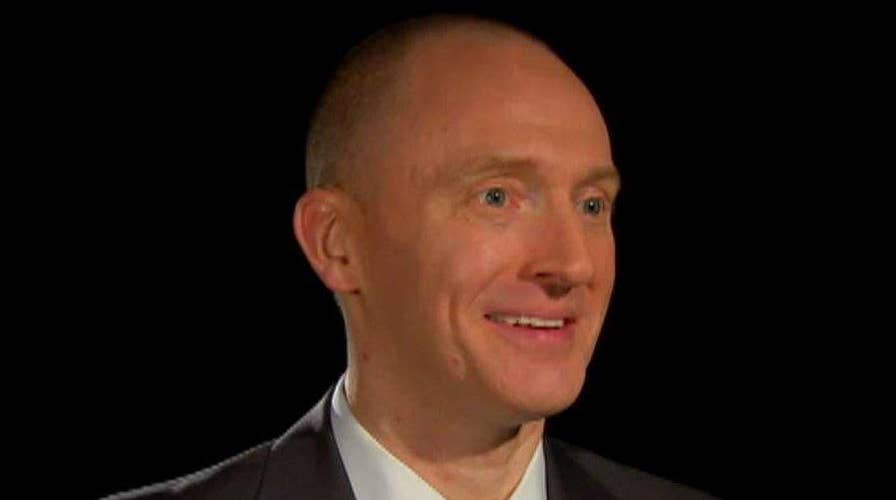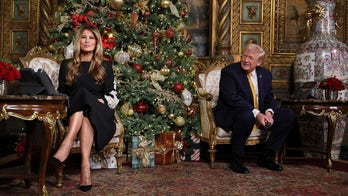Former Trump adviser Carter Page denies Russian relationship
The former foreign policy adviser denied allegations he colluded with Putin's government during the 2016 election; Catherine Herridge has the interview for 'Special Report'
The FBI obtained a court order last summer that granted them permission to monitor the communications of former Trump campaign adviser Carter Page, the Washington Post reported Tuesday.
The so-called FISA warrant was granted as part of an ongoing investigation into possible links between Russian officials and members of the Trump campaign, the paper reported.
The FISA court and its orders are highly secretive. Judges grant permission for surveillance if they agree there's probable cause that the target is an agent of a foreign power. Though the standard is a high bar to meet, applications are hardly ever denied.
In a statement to Fox News, Page said he was "excited the truth is coming out."
EX-TRUMP ADVISER CARTER PAGE RIPS 'FALSE NARRATIVE' ON RUSSIA COLLUSION
"It shows how low the Clinton/Obama regime went to destroy our democracy and suppress dissidents who did not fully support their failed foreign policy," Page added. "It will be interesting to see what comes out when the unjustified basis for those FISA requests are more fully disclosed over time."
The Post reported that a 90-day warrant was issued for Page and has been renewed more than once by the FISA court.
According to the paper, the government's application for the FISA warrant cited contacts Page had with a Russian intelligence operative in 2013. According to court documents filed earlier this month in connection with a separate espionage case, the Russian tried to recruit Page as an intelligence source.
Page, who was working as an energy consultant at the time, acknowledged that he "shared basic immaterial information and publicly available research documents" with the operative, Victor Podobnyy. He described the information as "nothing more than a few samples from the far more detailed lectures" he delivered at New York University in 2013.
In an interview with Fox News last month, Page said he had been victimized by a "false narrative" surrounding his contacts with Russian officials.
"I did nothing that could even possibly be viewed as helping them in any way," Page said at the time.
Page was hired by the Trump campaign as a foreign policy adviser in March 2016, but left the campaign that September because, as he put it, "these stories kept coming out based on the dodgy dossier."
That's a reference to the now-infamous "Trump Dossier" created by former British Intelligence operative Christopher Steele, working for a U.S. political research group called Fusion GPS on behalf of both Republicans and Democrats.
Page's relationship with Russia began to draw scrutiny during the campaign after he visited Moscow in July 2016 for a speech at the New Economic School. While Page said he was traveling in a personal capacity, the school cited his role in the Trump campaign in advertising the speech.
Page was sharply critical of the U.S. in his remarks, saying Washington has a "hypocritical focus on ideas such as democratization, inequality, corruption and regime change."
Days later, Page talked with Russia's ambassador to the U.S. at an event on the sidelines of the Republican National Convention. Attorney General Jeff Sessions spoke with the Russian envoy at the same event, a conversation he failed to reveal when asked about contacts with Russians during his Senate confirmation hearings.
Those who served on the Trump campaign's foreign policy advisory committee tell the Associated Press they had limited contact with Page.
But in a letter Page sent to the Senate intelligence committee last month, he cast himself as a regular presence in Trump Tower, where the campaign was headquartered.
"I have frequently dined in Trump Grill, had lunch in Trump CafΘ, had coffee meetings in the Starbucks at Trump Tower, attended events and spent many hours in campaign headquarters on the fifth floor last year," Page wrote. He also noted that his office building in New York "is literally connected to the Trump Tower building by an atrium."
Fox News' Catherine Herridge and Pamela Browne and The Associated Press contributed to this report.

























